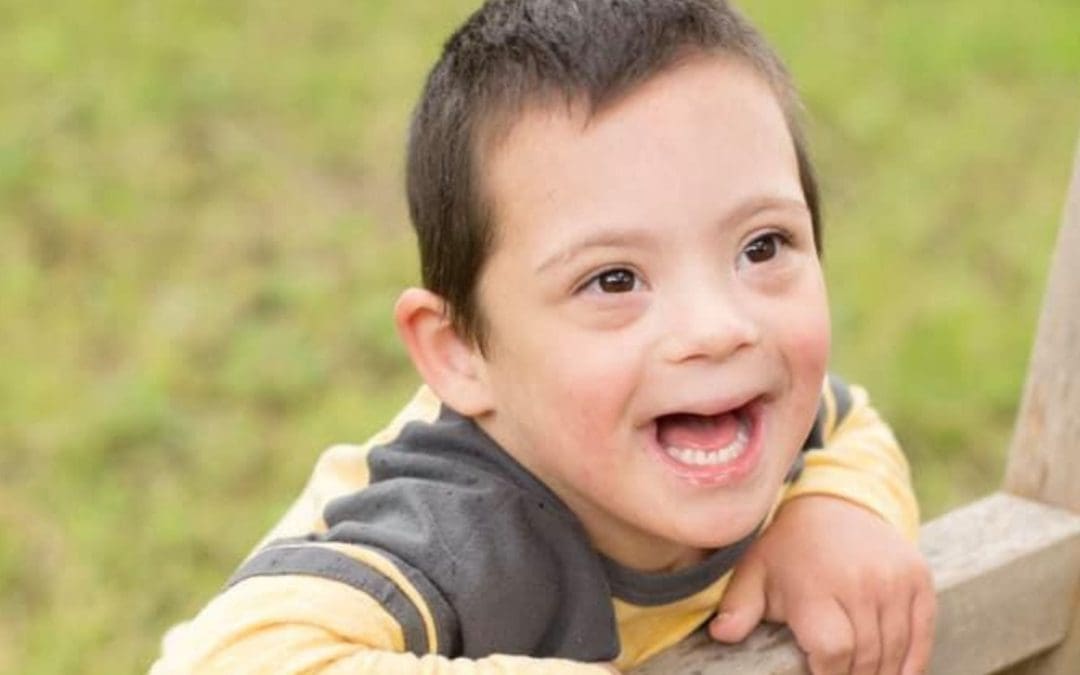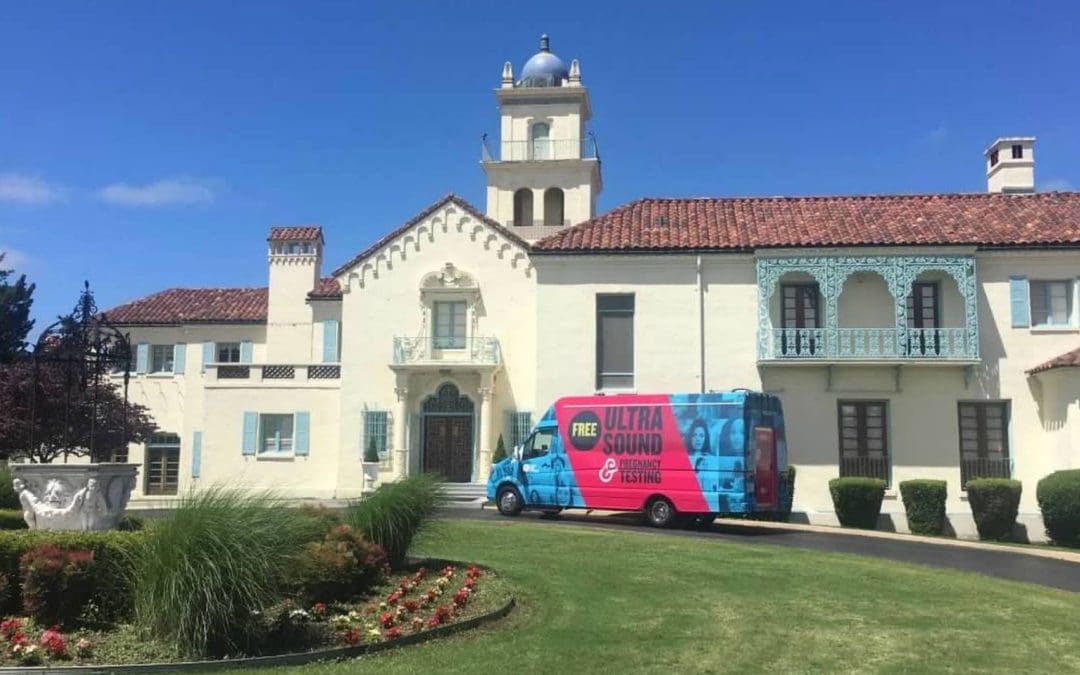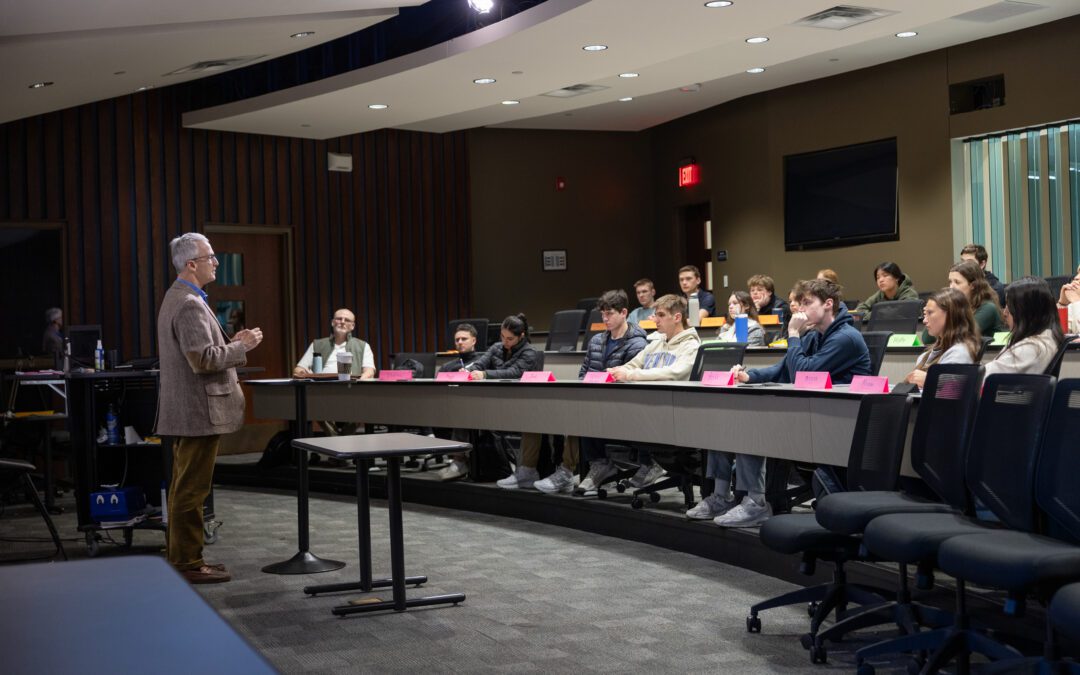When Amanda Dickinson and her husband, TJ, were preparing for the early, chaotic arrival of their second child, Kaleb, the nurses told them something sobering: “Don’t expect to hear him cry.”
The truth is, no one knew quite what to expect with Kaleb. A few days earlier, at the couple’s 28-week check-up, the doctor revealed that Kaleb hadn’t grown at all since their last visit. An ultrasound later showed that Kaleb had a heart defect that would require open-heart surgery. This defect would lead to a higher chance of being born with Down syndrome. An additional issue with blood flow through the umbilical cord—called reverse blood flow IUGR—would prove fatal if Kaleb wasn’t delivered soon.
“Our whole life felt flipped that day,” Dickinson, a professor in OKWU’s School of Education and Exercise Science, said. Six days later, she was in the hospital, hearing those terrifying words:
“Don’t expect to hear him cry.”
That warning wasn’t needed, in the end—Kaleb was delivered at 2 lbs., 2 ounces, and when Amanda was lying on the delivery table, she could hear a strident noise coming from the adjoining room. “I got to hear him cry,” she said. He was stable, and soon they brought him around to meet his parents.
What they didn’t know at the time was that they were just beginning a challenging 99 day stay in the NICU with their son.
Pushing to Achieve
Kaleb was born with two brain bleeds, which led to his rare diagnosis of Down syndrome and cerebral palsy. These extra challenges led to the extended stay in the NICU, and for 99 days, the Dickinsons made the hospital their home away from home, staying with Kaleb while both were working jobs at OKWU and raising their older son, Kaden.

Kaleb during his hospital stay
“For those three months, I turned the NICU room into my OKWU office,” Amanda said.
But in the days after Kaleb’s birth, as she spent time in the postpartum room and the hospital at large, Dickinson noticed a problem: parents in the NICU were often denied the usual joys of the birthing process.
“I found myself looking around the room, and it was bare of everything,” she said. “I remember thinking, I wish I had all the money in the world. I would get every NICU family a gift, something to recognize this life that’s just been brought into this world. No matter how scary, how uncertain, how short a life, there’s this brand-new life that’s just been born and needs to be recognized and celebrated.”
After Kaleb was finally able to go home—with oxygen tubes, feeding tubes, and various monitors—this seed of an idea eventually germinated to become Mighty Miracles Foundation, a non-profit run by Dickinson and her husband. The foundation exists to provide help to families with children currently in the NICU. Mighty Miracles sends out care packages—entirely free of charge to the parents—with useful resources and tools to make the process easier. Packages include World of the NICU, a booklet Dickinson wrote to walk others through the process, and Our NICU Story, a children’s book illustrated by families in NICUs all across the country and edited by OKWU’s own Dr. Keri Bostwick—a NICU mom herself.
 For Dickinson, the most critical aspect of the foundation is creating a support system for other mothers, a community of people bonded by a shared experience. “It’s been almost therapeutic,” she said.
For Dickinson, the most critical aspect of the foundation is creating a support system for other mothers, a community of people bonded by a shared experience. “It’s been almost therapeutic,” she said.
For those seeking to aid Mighty Miracles foundation, click the link here. Donations are always needed, and volunteers can also assist in putting care packages together. You can also read Amanda’s blog, where she documents the milestones of Kaleb’s amazing journey.
And speaking of Kaleb—he’s five these days, attending pre-school at Wesleyan Christian School in Bartlesville. It’s the culmination of years of watching, praying, and wondering. Would he ever be able to participate in daycare? Would he ever be able to go to school? Like so many other challenges in his life, Kaleb answered in the affirmative.
“He’s a very ornery, very stubborn, very independent little boy,” Dickinson said. “But I wouldn’t change one thing about it, because it’s what pushes him to achieve.”
No matter how scary, how uncertain, how short a life, there’s this brand-new life that’s just been born and needs to be recognized and celebrated.”
Joining the Family

TJ and Amanda as OKWU students
Dickinson’s OKWU connection began as a student. She achieved her undergraduate degree in physical education here on campus and was also an athlete, playing volleyball, basketball, and softball. “I would not recommend it,” she said of the time commitment.
During her time as a student, she fell in love with the familial aspect of the OKWU community, and it’s that emotional connection that strengthens her commitment to the university today. “This place has played such an important part in me and my husband’s life,” she said. “This is where we met. This is where we got together.”
Both she and TJ have been heavily involved in the community post-graduation—TJ as a former coach and Amanda as a professor. Her passion for the job is closely tied to the impact she has in shaping future educators within the School of Education and Exercise Science. “I get to teach these future teachers, these future therapists, these future coaches, that are then going to go out and get to be a part of so many lives,” she said. “I love that I get to be a small part of that.”
Dickinson recently achieved her doctorate from Concordia University, the end of a long journey that spanned the time before Kaleb was born. She endured through that process—taking a break to start Mighty Miracles Foundation—and through a devastating flood that did significant damage to the family home. During that period, they lived in campus housing here at OKWU. These challenges caused the process to last much longer than Amanda hoped, but it makes the achievement all that much sweeter. “For me, it felt like quite the journey to finally get to that finish line,” she said.

Amanda, TJ, Kaden, and Kaleb
Through her platform in the classroom and her work within Mighty Miracles, life is busy, to say the least. But the family is content with where God has placed them and determined to make the most of the witnessing opportunities that Kaleb’s story gives them. And they’re thankful for OKWU’s role in their lives.
“I could not think of a better job,” Dickinson said. “It really is a family here… I can say that from being a student, as well. You’re not just a number here. We know you. I know your favorite sports teams, I get to know what you like, your family dynamic, what you want to do for a career. And I can help tailor your degree to set you up in the best light for what you want to do. And we’ll adopt you into our family while you’re here.”
“I get to teach these future teachers, these future therapists, these future coaches, that are then going to go out and get to be a part of so many lives. I love that I get to be a small part of that.”



